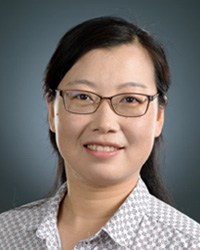
Qihui Zhou
Qihui Zhou obtained her PhD with highest distinction (summa cum laude) from the Ludwig-Maximilian-University to study microRNAs regulating human regulatory T cell function, providing insights into immune dysregulation in disease. With consistent interest in translational research, she joined the lab of Prof. Dieter Edbauer at DZNE to devote herself to ALS research. She made important contributions to understanding the disease pathological mechanism of C9orf72 ALS – a most common genetic cause of ALS driven by the GGGGCC hexanucleotide repeat expansion. The Zhou team integrates T-cell–focused mechanistic immunology and the development of an active vaccine now advancing toward clinical translation. Her work was recognized by many awards, including the ERC Starting Grant, the ENCALS young investigator award, Ono Pharm rising star, among others. She and her team will try to unravel the cause and consequence of γδT17 cell recruitment in C9orf72 ALS.
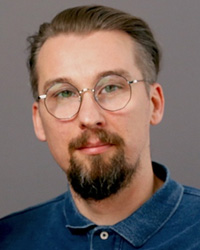
Dr. Patrick Lüningschrör
Patrick Lüningschrör obtained his PhD in 2012 at Bielefeld University in the lab of Christian Kaltschmidt. As a postdoctoral fellow, he joined the lab of Michael Sendtner at the Institute of Clinical Neurobiology, University Hospital Würzburg. In 2019, he started his independent research group at the same Institute. As of 2026, Dr. Lüningschrör will join the newly established Department of Cell Biochemistry at Bielefeld University as a Senior Scientist with Markus Damme as head.
The project funded here aims to shed light on ALS-related, cell-intrinsic pathophysiological changes in perisynaptic Schwann cells and their contribution to non-cell-autonomous motor neuron dysfunction and degeneration.
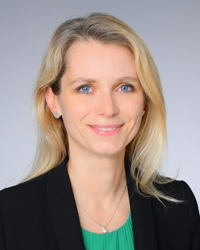
Prof. Sabine Liebscher
Sabine Liebscher obtained her MD from the Technical University of Dresden, Germany before joining the Lab of Paul Greengard, New York, USA in 2007. She then pursued her PhD at the Ludwig-Maximilians University Munich (lab of Christian Haass) and the Max Planck Institute of Neurobiology (lab of Tobias Bonhoeffer) in Munich, Germany. In 2014 she became a Clinicial Scientist group leader at the University hospital Munich, Germany and started her own independent group in 2017 (Emmy Noether group leader) at the same institution in 2017. In 2023 she was appointed as W2 Professor for Cellular Neurophysiology at the University of Cologne, Cologne, Germany and as of 2025 Sabine Liebscher is a professor and the director of the Institute of Systems Neurobiology at the Medical University of Innsbruck, Austria.
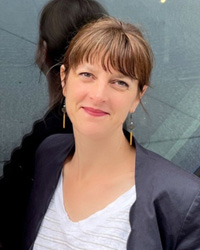
Dr. Caroline ROUAUX
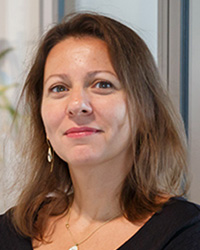
Professor Magdalini Polymenidou
Magdalini Polymenidou is Associate Professor of Biomedicine at the Department of Quantitative Biomedicine of the University of Zurich (UZH). She joined UZH as an Assistant Professor in 2013 and since then, her research team studies the molecular mechanisms of amyotrophic lateral sclerosis (ALS) and frontotemporal dementia (FTD). Her team combines structural and biochemical analyses with cellular assays and animal models to identify new therapeutic targets from ALS and FTD. Her work was recognized by many awards, including the ERC Consolidator Grant, the NIBR Global Scholars Award, the Georg-Friedrich Götz Prize, and the EMBO Young Investigator Award, among others.
As a postdoctoral fellow in the group of Don Cleveland at the University of California in San Diego (USA), she used genome-wide approaches to understand the function of the RNA-binding proteins TDP-43 and FUS, which play key roles in the pathogenesis of ALS and FTD. She made important contributions to our understanding of TDP-43 pathophysiology including the initial identification of its RNA targets in the normal brain, a study that signified a major first step in understanding its normal function, whose perturbation is a key step in disease. Since 2013, her independent research team studies the molecular mechanisms of ALS and FTD combining structural and biochemical analyses with cellular assays and animal models aiming to identify new therapeutic targets for these diseases. The Polymenidou team explored the neuropathological heterogeneity of TDP-43 and provided evidence for the existence of “TDP-43 strains”. Her lab solved the high-resolution structure of the N-terminal domain (NTD) of TDP-43 and showed that NTDs from neighboring TDP-43 molecules interact to form physiological self-oligomeric structures in cells. The formation of these physiological oligomers is necessary for the normal splicing regulation by TDP-43. Importantly, the study demonstrated that this physiological TDP-43 oligomerization antagonizes its pathological aggregation. The team has also developed tools to detect and quantify physiological oligomerization and aggregation in cells. In recent work, the team has developed iNets, a highly reproducible and long-lasting human neural culture model that effectively simulates neurodegeneration, and identified NPTX2 as a novel crucial player in TDP-43 proteinopathies.
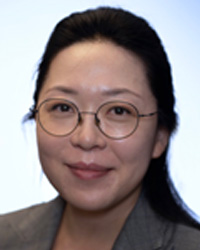
Dr.Jeehye PARK
Dr. Jeehye Park is a Senior Scientist in the Genetics and Genome Biology Program at Sick Kids Research Institute and an Associate Professor in the Department of Molecular Genetics at University of Toronto. She is a Canada Research Chair (Tier 2) in Molecular Genetics & Neurodegenerative Diseases.
Park lab currently focuses on studying the molecular mechanism of a neurodegenerative disease, amyotrophic lateral sclerosis (ALS), utilizing a multi-disciplinary approach including biochemistry, molecular cell biology and fly and mouse genetics to ultimately improve understanding of the disease and develop therapeutic strategies. Recently, Park lab established an ALS model, MATR3 S85C knock-in mice, that closely mimics the human disease genotype and phenotype, offering enhanced disease relevance compared to existing models in the ALS field and providing an unprecedented opportunity to study the early-stage development and progression of ALS. Using this mouse model, they will 1) identify the early disease events in the disease process, 2) determine the role of disease-associated microglia (DAM) during early disease progression and 3) determine how the ALS-linked mutation alters MATR3 function and properties to cause neurodegeneration. Their findings will uncover the early disease process, which may change the view of how ALS develop and progress. Defining the key early events will facilitate the development of early prevention and intervention strategies for ALS.
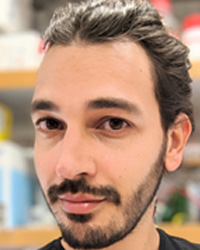
Prof. Steven Boeynaems
In the Boeynaems lab, we aim to understand how cells and organisms sense and respond to cellular stress, which remains a poorly understood area of cell biology. Over the years, this has led us to study a variety of stress paradigms in physiology and disease with an emphasis on the role of tandem repeats, intrinsically disordered proteins, and biomolecular condensates. Our goal is to create biosynthetic and -mimetic tools for synthetic biology, and to translate fundamental biological insights into novel therapeutic approaches for human diseases. We have specifically focused our attention on a spectrum of neurodegenerative diseases that centers on amyotrophic lateral sclerosis (ALS) and frontotemporal dementia. Our work has contributed deep insights into the role of condensates in the development of the hallmark protein aggregation pathology, we have implicated nucleocytoplasmic and axonal transport defects in ALS disease etiology, and we have identified new genetic risk factors and promising targets for therapeutic modulation.
Steven Boeynaems obtained a B.Sc. and M.Sc. degree in Bioengineering at KU Leuven, before receiving his Ph.D. in Biomedical Sciences in 2017 working in the Ludo Van Den Bosch lab at KU Leuven and the Flemish Institute for Biotechnology (VIB) in Belgium. He joined the Aaron Gitler lab at the Genetics Department of Stanford University as an EMBO Long-Term Fellow for his postdoctoral work. In 2022, Steven became an Assistant Professor at the Department of Molecular and Human Genetics at Baylor College of Medicine and an Investigator at the Jan and Dan Duncan Neurological Research Institute at the Texas Children’s Hospital in Houston. He is a CPRIT scholar, and a member of the Therapeutic Innovation Center, the Dan L Duncan Comprehensive Cancer Center, and the Center for Alzheimer’s and Neurodegenerative Disease.
In the Boeynaems lab, we aim to understand how cells and organisms sense and respond to cellular stress, which remains a poorly understood area of cell biology. Over the years, this has led us to study a variety of stress paradigms in physiology and disease with an emphasis on the role of tandem repeats, intrinsically disordered proteins, and biomolecular condensates. Our goal is to create biosynthetic and -mimetic tools for synthetic biology, and to translate fundamental biological insights into novel therapeutic approaches for human diseases. We have specifically focused our attention on a spectrum of neurodegenerative diseases that centers on amyotrophic lateral sclerosis (ALS) and frontotemporal dementia. Our work has contributed deep insights into the role of condensates in the development of the hallmark protein aggregation pathology, we have implicated nucleocytoplasmic and axonal transport defects in ALS disease etiology, and we have identified new genetic risk factors and promising targets for therapeutic modulation.

Dr Alan Yu
Dr Alan Yu is Head of the Neuroinflammation Laboratory at The Florey Institute of Neuroscience and Mental Health. He received his PhD from The University of Queensland Diamantina Institute (UQDI) in 2015, for studying the inner workings of the innate immune systems upon bacterial infection under co-supervision of Prof. Antje Blumenthal and Prof. Ian Frazer. In 2016, he proposed to investigate the biology behind neurodegenerative processes through the lens of innate immunology, earned a highly prestigious 5-year WEHI Centenary Fellowship and started his postdoctoral training in the laboratory of Prof. Seth Masters.
Dr Yu was strategically recruited to the Florey Institute in late 2021. Dr Yu aspires to establish an interdisciplinary research program that brings expertise in biomedical/clinical sciences, computational biology and an entirely novel spatial multi-omics technology via partnership with world-class leaders to transform the way we perceive the cause(s) and pathogenesis of ALS, with clinical impacts.
Dr Yu has received grants from the NHMRC (Ideas Grant and Investigator Grant), a Medicine/Science Grant from the CASS Foundation, and has been nominated by the WEHI Director for 2021 Australian Museum Eureka Prize for Outstanding ECR, based on his achievements in ALS research.
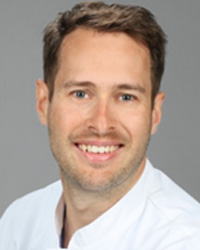
Dr. David Brenner
Dr. Brenner studied medicine at the Ruprecht-Karls-Universität Heidelberg. In his MD thesis at the German Cancer Research Center Heidelberg he examined the pathogenic role of the CD95 system in circulating myeloid cells in a mouse model for Parkinson’s disease in the group of Prof. Dr. Ana Martin-Villalba. He obtained postdoctoral training at Prof. Jochen Weishaupt’s lab in Ulm and Mannheim. During this period, he contributed to the identification of the ALS genes NEK1 and KIF5A, and studied the downstream effects of haploinsufficiency of TBK1 in transgenic mouse models.
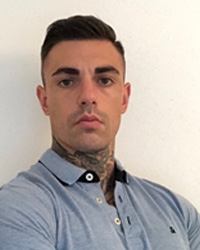
Dr. Alberto Catanese
Both scientists recently teamed-up with the goal to identify the molecular mechanisms underlying ALS linked to mutations in the NEK1 gene (NEK1-ALS). To that end they use multi-omic and hypothesis-driven differential analyses of isogenic and patient-derived iPSC-derived motor neurons bearing NEK1 loss-of-function and missense variants followed by validation in CNS autopsy tissue from NEK1-ALS patients (cooperation with the University of Umea). The project will provide important mechanistic insights into NEK1-ALS with the potential to impact genetic counselling of variants of uncertain significance and fuel the identification of specific biomarkers and pharmacological targets for future clinical trials for NEK1-ALS.
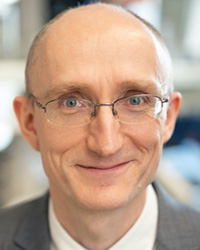
Dr. Lewandowski
Sebastian Lewandowski received his undergraduate degree from the University of Gdansk and obtained his PhD in molecular biology from the Nencki Institute of Experimental Biology in Warsaw. He performed his postdoctoral training at laboratory of Prof. Ulf Eriksson at the Karolinska Institute. Dr Lewandowski is a member of the Swedish Medical Association, Swedish Society for Neuroscience and a steering group member of the junior faculty at the Karolinska Institute. In addition to the support from the Frick Foundation his group is supported by the Ulla-Carin Lindquist Foundation for ALS, Swedish Research Council and the Olle Engkvist Foundation.
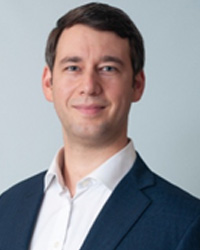
Dr. Daniel Mordes
His recent research efforts have involved the characterization of the cellular effects of dipeptide repeat proteins associated with the C9ORF72 repeat expansion. Additionally, his lab is focused on understanding how perturbations in autophagy-associated pathways, which act to maintain protein homeostasis, can lead to familial forms of ALS. With the Frick Foundation, he aims to develop new models for these types of ALS using human stem cell lines. Overall, the goal of his lab is to investigate the pathogenesis of neurodegenerative diseases to facilitate the development of targeted therapies. His research has also been recognized by awards from the ALS Association, the Multiple System Atrophy Coalition, and the National Institute of Neurological Disorders and Stroke.

Drs. Kevin P. Kenna
Dr Kevin Kenna is an assistant professor at the University Medical Centre Utrecht (Netherlands). He received his PhD from Trinity College Dublin (Ireland) in 2015, for analyses of rare genetic variation across genes, networks and biological pathways implicated in amyotrophic lateral sclerosis (ALS). He conducted his postdoctoral training at the University of Massachusetts Medical school, in the laboratory of Prof John Landers.
As a group leader, Dr Kenna continues to work on using genomic technologies to guide translational research and informative genetic testing in ALS. His group combines advanced computational techniques with genetic methods and multi-omic profiling of human post mortem tissue and stem cell models. In particular, Dr Kenna is focused on extending his work to the 98.5% of human genetic variants with effects in the non-coding genome. He does this in close collaboration with project MinE, the Dutch ALS centre and additional collaborators in Europe and the US.
Dr Kenna has received a vidi award from ZonMW, compute grants from NWO and additional funding awards from the Dutch ALS foundation (ALS Stichting).
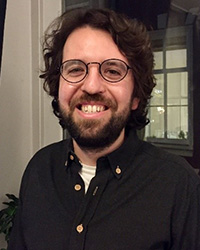
Dr. James Mills
In his current positions, Dr Mills leads computational biology teams that focus on utilising and integrating multi-omic approaches, including whole genome sequencing, transcriptomics, and DNA-methylation, to elucidate pathogenic mechanisms in complex diseases such amyotrophic lateral sclerosis, Parkinson’s disease and epilepsy. He continues to investigate regulation of the protein-coding transcriptome via non-coding RNA, as well as expanding his research lines to investigate structural variation in the human genome and gene expression changes at the level of a single cell.
Dr Mills has received grants from the Netherlands Parkinson Foundation (Stitching Parkinson’s fonds), the Top Sector for Knowledge and Innovation, and Amsterdam Neuroscience.
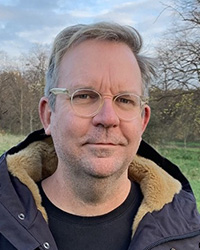
Dr. Bradley Smith
Dr.Smith is a Senior Research Fellow at the Maurice Wohl Clinical Neuroscience Institute in Camberwell, London. He obtained a PhD in 2007 studying the neurogenetics of ALS in the laboratory of Professor Chris Shaw. From 2010 as a Postdoctoral Researcher in Professor Shaw’s lab he led the UK arm of the Familial ALS Exome Sequencing Consortium and identified mutations in TUBA4A and most recently in the calcium and phospholipid binding gene Annexin A11.
